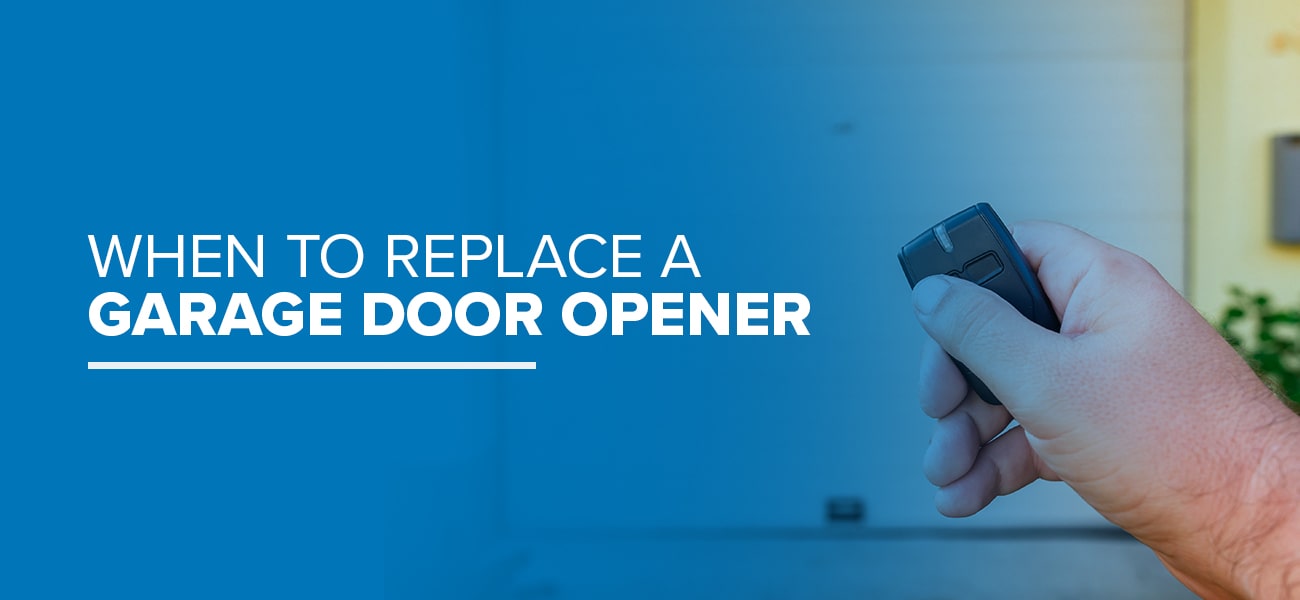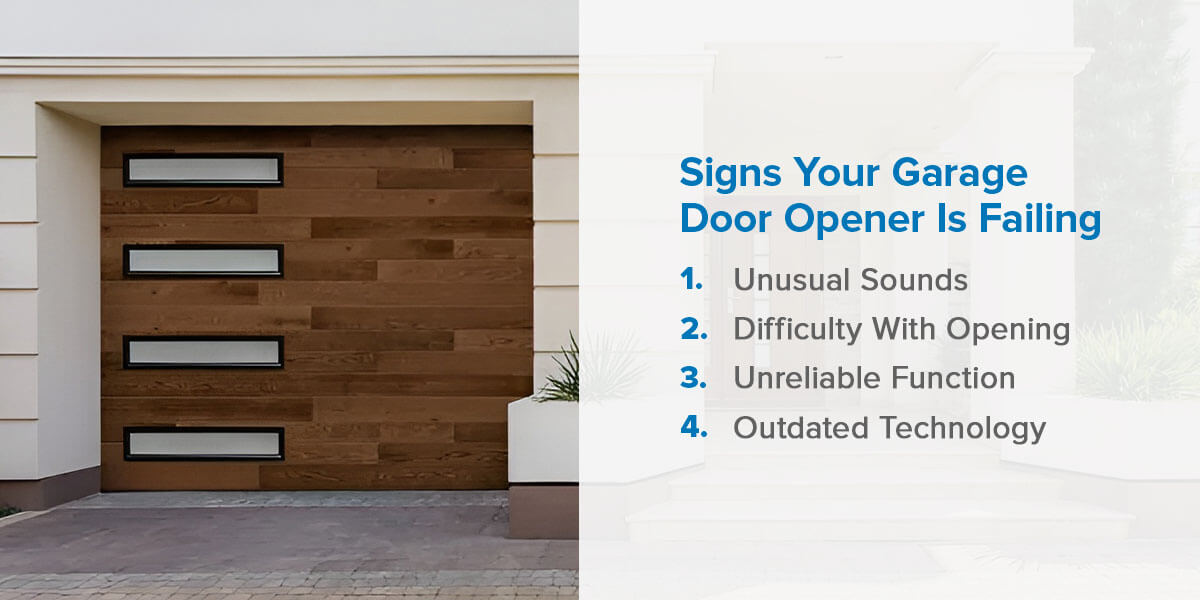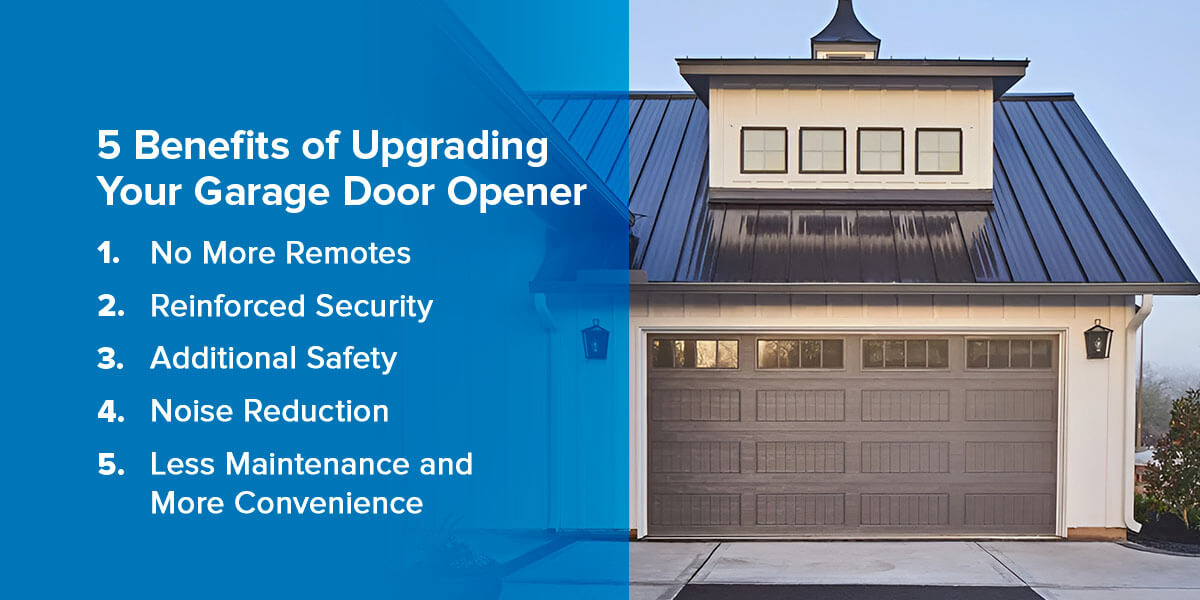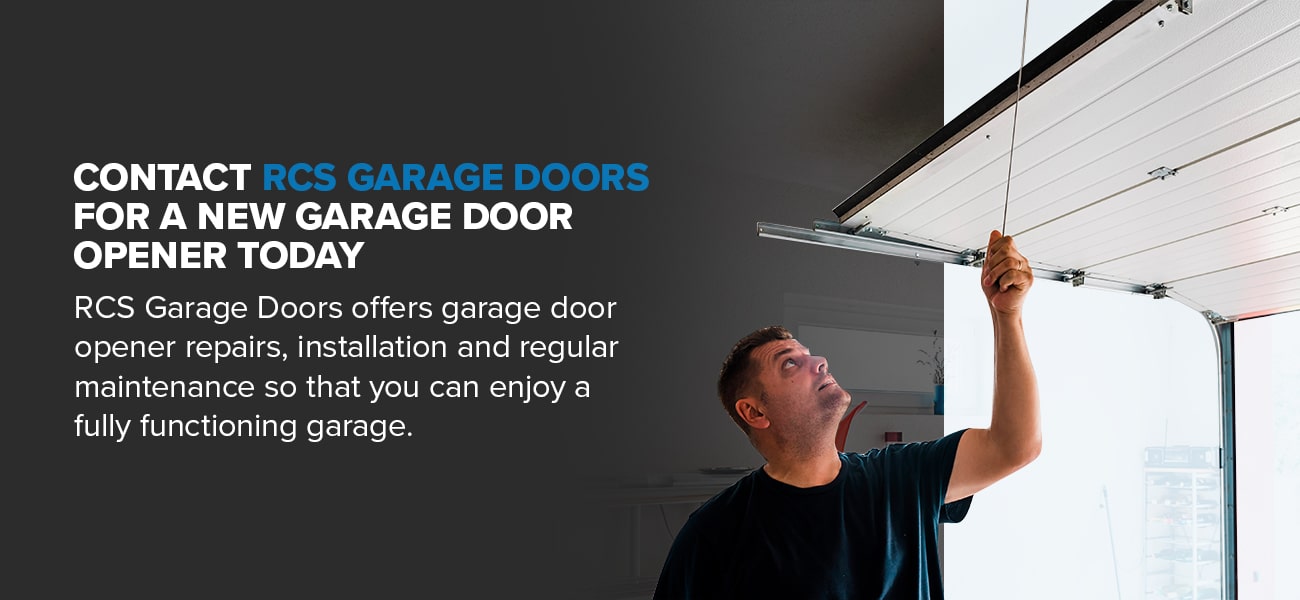How Long Do Garage Door Openers Last? Learn When to Replace It
Many people use their garage door multiple times a day. With a quality and well-maintained garage door opener, you can continue to enjoy the convenience of one of the most important entryways to your home.
However, openers are subject to wear and tear and malfunctions like any other electronic device or machinery. It’s important to know when to replace your garage door opener to ensure uninterrupted use and optimal performance.
In this blog, we’ll help you learn the signs. Also, you’ll learn how long garage door openers last and how to replace them before they fail. So, keep reading and learn the facts well.
Signs Your Garage Door Opener Is Failing
It’s best to replace your garage door opener when you notice signs that it’s failing, as a total breakdown could leave you without access to your garage. If the malfunction occurs mid-use, the unit could drop the garage door, leading to structural damage or serious injuries.
Here are the signs that indicate a garage door opener replacement:
1. Unusual Sounds
If your garage door is too loud or produces unusual sounds, there’s a mechanical issue. The same applies to your opener. While it’s normal for a garage door opener to make noises because it runs on motors. So, unusual sounds that seem out of place are a sign that there’s an issue with one or more components.
Loud noises are not normal. You may also hear odd rattling or screeching noises coming from your unit. You want to pay attention to these sounds even if they are not fully noticeable.
Remember, trying to repair your garage door or its opener yourself is not safe, as there’s a risk of injuries and electrocution. You should work with a reliable garage door company for repairs and replacements.
2. Difficulty With Opening
A garage door weighs over 200 pounds. The garage door opener’s motor relies on a system of springs and pulleys to open and close the door. If any part of this system fails, the defective opener will be unable to lift your garage door properly.
A garage door that has difficulty opening might:
- Get stuck up, down, or in between.
- Open halfway and reverse.
- Door open, move and very slowly.
- Lift unevenly.
- Shake while opening.
- Drop halfway.
If you notice any of these signs, you will likely need a garage door opener motor replacement.
3. Unreliable Function
Garage door openers are reliable devices designed to seamlessly open and close garage doors for their entire life span. If your opener is older and malfunctioning, it may have outlived its useful life. However, if your opener is relatively new, it’s likely something a professional can fix.
A garage door opener that fails to work sometimes, only to resume functionality later, is already failing. If you notice a pattern of unreliable function, you should call in a professional garage door service provider to examine it.
4. Outdated Technology
Older opener technology means subpar performance compared to today’s standards. If your garage door opener is stuck in the past, it’s time to transition to the future with a new LiftMaster garage door opener. Modern garage door openers come with amazing new features to make your life easier.
Don’t miss out on the benefits of upgrading to more advanced technology to enhance your garage door. Innovative garage door openers are also much safer, as they also protect your home and your family in areas like Bailey Springs Dr and Anniston Way, Davidson.
5. Other Signs
Several red flags suggest it’s time for a replacement. These include the door opening or closing on its own, a burning smell from the unit, or a motor that runs nonstop. Missing modern safety features, lack of battery backup, or an opener that’s over 10 years old are also strong indicators.
What’s the Lifespan of a Garage Door Opener?
The life expectancy of a garage door opener is pretty long. It usually lasts a good 10-15 years. How long it lasts depends on how well you take care of it. Since most people open and close their garage doors many times each year, regular checkups can help the opener last longer.
Here’s a short table on the lifespan of different garage door opener brands:
| Brand / Type | Typical Lifespan | Notes |
|---|---|---|
| LiftMaster | 15 – 20 years (optimal), 8 – 12 years (less ideal conditions) | High durability, especially in optimal environments. |
| Chamberlain | Up to 15 – 20 years | With proper maintenance, openers can reach long lifespans |
| Genie | ~10 – 15 years | Average lifespan consistent with general expectations. |
| Craftsman (½ HP) | ~10 – 15 years | Dependent on usage, maintenance, and environmental factors |
| Belt-Drive Openers (general) | ~15 – 20 years | Known for quiet operation and lasting longer than chain or screw drives. |
Having a professional look at your opener once or twice a year can make a big difference. They check all the parts, like springs, rollers, and cables, and replace anything that is worn out.
They also clean the tracks and put oil on the moving parts so the door slides up and down easily. If the door does not move evenly, they adjust the garage door springs and test the safety features to make sure everything works correctly.
Even if your opener is old but still works, you might want to think about upgrading. Newer models have extra safety and convenience features. When it’s time to replace your opener, you can choose modern options, like LiftMaster openers. It includes the latest technology to make your garage safer and easier to use.
When to Repair vs Replace Your Garage Door Opener
Sometimes a garage door opener has small problems that can be fixed, while other times it might be better to replace the whole unit. If you know when to repair and when to replace, it can save both your money and prevent bigger issues later.
Here’s a simple guide to help you decide when to replace a garage door opener or repair:
Signs You Should Repair Your Garage Door Opener:
- The door moves slowly or jerks a little when opening or closing.
- You hear unusual noises, like grinding or squeaking, but the door still works.
- The opener sometimes does not respond to the remote or wall switch.
- Minor parts like rollers, springs, or cables are worn and need garage door opener replacement.
- The opener is under 10 years old and mostly in good condition.
Signs You Should Replace Your Garage Door Opener:
- The opener is over 12-15 years old and breaks down often.
- Repairs are expensive, or the parts are hard to find.
- The door does not move properly even after repairs.
- You want better safety features, like automatic reverse sensors or smartphone control.
- The opener is very noisy or weak for overlapping the garage door opener lifespan. Thus, daily use becomes very difficult.
Small repairs can keep your garage door working smoothly for a few more years. But if your opener is old, unreliable, or missing modern features, garage door opener replacement is usually the smarter choice.
Regular maintenance can help either option last longer. Also, it can keep your garage door safe and convenient for daily use on S Main St, Davidson.
If you want to repair or replace your garage door opener, then contact RCS Garage Door.
How to Replace an Old Garage Door Opener?
Replace an old garage door opener to make your garage safer, quieter, and easier to use. Follow simple steps to remove the old unit, set up the new one, connect safety sensors, and test for smooth operation.
Step 1: Choose the Right Opener
Before removing your old opener, you should pick a new one that fits your garage and needs. Check the weight of your garage door and choose an opener that can handle it. Modern openers often come with safety sensors, smartphone control, and quieter motors.
Step 2: Disconnect the Old Opener
You should turn off the power to your garage opener at the circuit breaker. Unplug the unit and disconnect the door from the opener by pulling the release cord. Then, remove the mounting hardware that holds the opener to the ceiling and wall. You must make sure the door is supported so it doesn’t move while you work.
Step 3: Install the New Opener
Follow the instructions that come with your new opener. Usually, you start by attaching the mounting bracket to the ceiling and the rail to the door. Then connect the motor unit to the rail. You should make sure all bolts and screws are tight and the opener is level.
Step 4: Connect the Safety Features
You should attach the safety sensors near the bottom of the door tracks. These sensors prevent the door from closing on objects or people. Plug in the opener and test the remote and wall controls. Don’t forget to make sure the door opens and closes smoothly.
Step 5: Final Adjustments and Testing
Try to check the balance of your garage door. Adjust the force and travel limits on the opener if needed. Then you should test the automatic reverse feature by placing an object under the door to ensure it stops and reverses correctly.
You can replace your garage door opener easily if you go through each step with care. These can ensure safety, smooth operation, and a longer life for your new opener by taking your time.
5 Benefits of Upgrading Your Garage Door Opener
A new garage door opener can improve safety, add convenience, reduce noise, boost security, and cut maintenance. If you install modern models, it will help you enjoy easier daily use while keeping your garage and home better protected.
1. No More Remotes
Many new garage door openers can connect to the Internet, as they will let you control your door from your smartphone. You can check whether your garage is open and close it remotely if needed. With these features, you don’t need a traditional remote anymore.
2. Better Security
Modern openers include advanced safety features that go beyond a regular lock. These features help prevent intruders and keep your home safer. Some of the key upgrades include:
- Automatic lighting: Turns lights on when the door moves to discourage break-ins.
- Rolling codes: Changes the access code each time the door is used; as a result, it prevents hacking.
- Vacation mode: Lock the garage when you are away.
- Temporary guest codes: Let the friends or family enter, then automatically expire.
These nice improvements give you more control and peace of mind.
3. Improved Safety
Garage doors are heavy and can be dangerous if they fall. New openers include safety systems to reduce accidents. Auto-reverse sensors stop and reverse the door if it hits something or the photo-eyes’ light beam is broken—many units will beep to warn you when this happens.
You may also hear the garage door opener beeping before an automatic close (timer-to-close) or when the opener switches to battery backup during a power outage. That backup lets you open the door without power, so you don’t have to lift it by hand.
4. Quieter Operation
Older garage door openers with chain or cable drives are noisy. New models use reinforced rubber belts and DC motors.
- Rubber belts: Strong like chains but much quieter.
- DC motors: Start slowly, run smoothly, and stop gently. So, it reduces stress on the door.
These new features make the garage door much quieter & pleasant to use, especially in homes attached to living spaces.
5. Less Maintenance and More Convenience
A new opener usually requires fewer repairs than an older one. You can rely on it to work day after day without worry. Modern openers also include features like smartphone control and alerts. So, it makes daily use safer and more convenient.
A new upgraded garage door opener improves safety, security, and convenience. It makes daily life easier, protects your home, and ensures your garage door works smoothly for years to come.
Contact RCS Garage Doors for a New Garage Door Opener Today
Our experts at RCS Garage Doors make replacing a garage door opener easy. Don’t hesitate to reach out to us with any of your opener questions. We are proud to offer the latest opener technology from industry-leading manufacturer LiftMaster, and we are sure to have the perfect opener for you!
RCS Garage Doors offers garage door opener repairs, installation, and regular maintenance in Charlotte, NC, and additional areas so that you can enjoy a fully functioning garage. Contact us today to schedule an installation for your new garage door opener.
FAQs
How Much Does It Cost to Replace a Garage Door Opener?+
Replacing a garage door opener typically costs between $250 and $600, depending on the brand, type, and features. Professional installation may add $100-$200. High-end models with smart controls or extra safety features can cost more.
Should I Repair or Replace My Garage Door Opener?+
Repair your opener if it is under 10 years old and only has minor issues like worn rollers or sensors. You can replace it if it is over 12-15 years old, breaks down often, or lacks modern safety and convenience features.
How Long Do Garage Door Opener Batteries Last?+
Garage door opener batteries usually last 1-2 years, depending on usage and battery type. Rechargeable batteries may last longer if maintained properly. You should always check the battery for weak performance or corrosion.
How Long Does a LiftMaster Garage Door Opener Last?+
LiftMaster garage door openerstypically last 12-15 years with regular maintenance. Proper care, including lubrication, inspections, and timely repairs, can extend the garage door opener’s lifespan even further. Modern models also include safety and smart features.
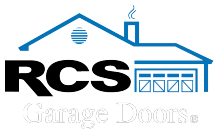

 Register My Door
Register My Door
